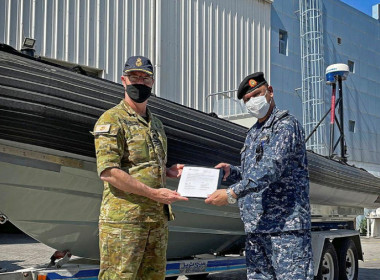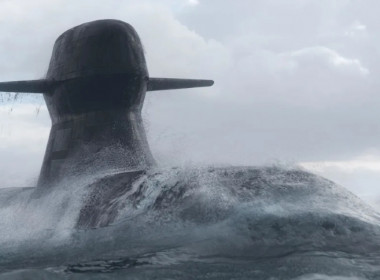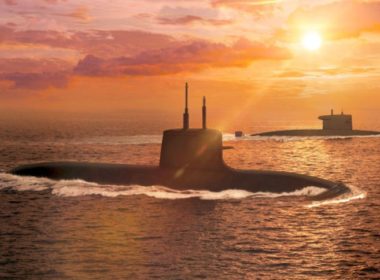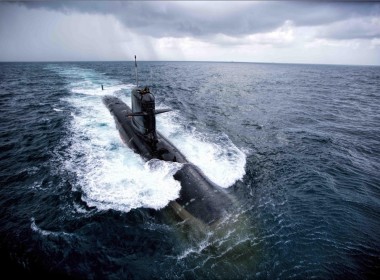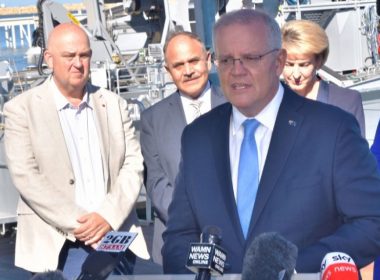OPINION | Former defence minister: there’s broad support in the region for Australian submarines

While helping negotiate the AUKUS agreement with the United States and Britain as defence minister in 2021, Peter Dutton regarded claims that Australia acquiring nuclear-powered submarines (SSNs) would contribute to a regional arms race as “nonsensical”.
And Dutton, now opposition leader, says regional leaders privately supported Australia’s decision to procure the conventionally-armed SSNs.
“All of them, frankly, in private, are supportive of Australia’s position, and I think we should take comfort from that,” Dutton tells former ASPI executive director Peter Jennings in a video interview as part of ASPI’s “Lessons in leadership” series. The interview took place when Dutton was seven months into his role as defence minister in Scott Morrison’s government.
“They want stability in our region,” he says. “They’re enjoying relative economic success today, stability in their own countries because people are being lifted from poverty, they are joining the middle class. There’s a period of stability that hasn’t been possible since the Second World War, or in the case of Vietnam since the Vietnam War, or on the [Korean] Peninsula since conflict there. And they want that to enjoy, as we do.”
Clearly caught by surprise at the time of the initial AUKUS discussions, some regional nations then expressed strong concern about the SSN agreement.
“Rapidly building the skills to safely operate the SSNs is incredibly important, Dutton says, but it’s not going to happen overnight.”
To put AUKUS into context, Dutton says that every 18 months, China is pumping out, on average, naval tonnage greater than the entire British fleet.
Dutton was defence minister from March 2021 to May 2022. He says in the interview he wants to see rapid acquisition of equipment the ADF needs including the intellectual property for Australia to manufacture missiles. And he wants to ensure the presence in the Indo-Pacific of forces from those partners.
“It was a natural go-to for us because of the interoperability between the three partners, and it builds off the Five Eyes relationship and the trust, the established systems of information and intelligence sharing, joint operations and exercises.”
AUKUS also includes space and cyber. “I see the cyber effort as paramount for us because, regardless of what happens in relation to Taiwan, China will continue her grey zone activities. And there will be the continued attacks, the theft of IP from our system, the targeting of people within the defence supply chain.”
Tangible gains from AUKUS will include both offensive and defensive technology with much more on quantum and underwater capabilities, investment across the top of Australia, and the jobs that go with maintenance and sustainment in Australia, Dutton says.
Acquiring eight SSNs is part of a strategy of deterrence and the buildup to the defence of the homeland. “We’ve not had to think about that since the 1940s. And we’ve got ourselves on a track where there’s greater capacity to defend ourselves, but to provide deterrence before we got to that point of extremis.”
Rapidly building the skills to safely operate the SSNs is incredibly important, Dutton says, but it’s not going to happen overnight.
“The US is very serious about nuclear stewardship. The UK has had this capability since the mid-1950s, and they’re still learning through the course of the different iterations, different blocks, and the different platforms that they’ve delivered.”
The US does not want an accident, and the UK had not suffered one. “We’re not going to either,” he says. Establishing those foundation stones is incredibly important to the Americans, and to Australia.
“Allowing China to take Taiwan by force would see a domino effect and a shift in world power, Dutton says.”
On possible threats to Australia, Dutton says President Xi Jinping and others in China’s Communist Party have been very clear about their intentions for Taiwan. China has also been involved in land border clashes with India. Japan has faced daily intimidation by Chinese military personnel in coast guard uniforms.
Other nations, including Australia, face economic coercion when China stops importing certain commodities. Others face corrupt practices in Beijing’s Belt and Road Initiative.
“We want to be a great trading partner and friend with China. We want to continue that relationship. But the cyber attacks and the foreign interference, the attempts to interfere with democratic processes—all of that is not the act of a friend.
“We want to see China continue to grow, people to enjoy prosperity, and we don’t seek conflict with China. We never have, and we never will. But if there’s an attack on Taiwan, if there’s an escalation in the East China Sea of tensions there that result in, deliberate or otherwise, escalation of some sort of conflict, then that could well be a reality. And we need to be honest and open and frank about that. And I think the Australian public has a greater level of awareness now than perhaps they have for a long period of time about the direction now.”
Allowing China to take Taiwan by force would see a domino effect and a shift in world power, Dutton says. Australia would be quickly isolated.
This is a condensed version of the author’s original Strategist article.


